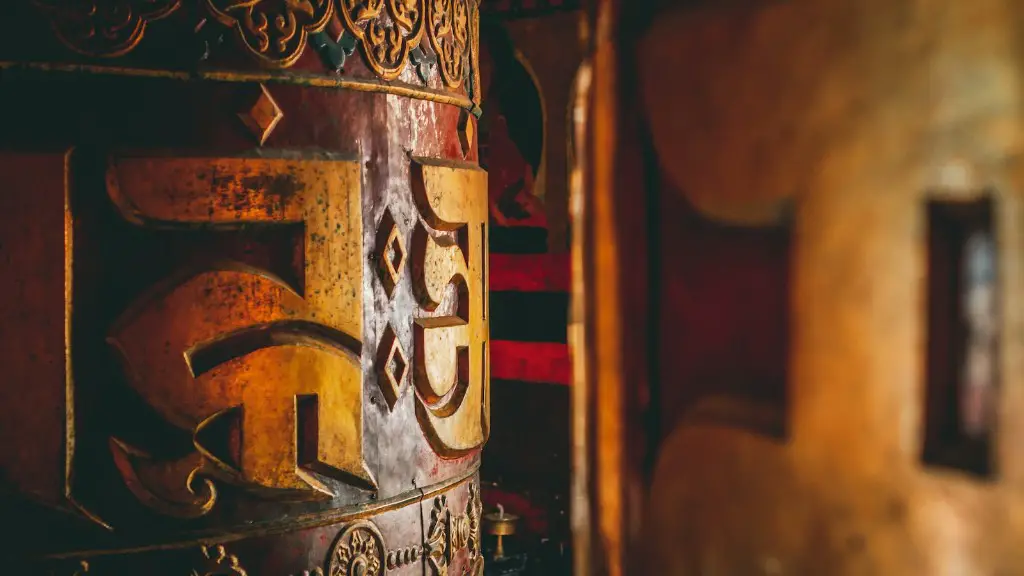Who Is The Best God In Hinduism
Hinduism is the oldest religion known to mankind. It is an ancient faith that is deeply rooted in the culture of India and its neighboring countries. The basic idea of Hinduism is that there is one Supreme Being, Brahman, the Absolute Reality, who creates and maintains the universe. Brahman is beyond the physical world and its limitations and is believed to be the source of all knowledge and ultimate truth. Various gods and goddesses are worshipped as manifestations of Brahman.
The pantheon of Hindu gods is vast and varied, and each has its own significance and attributes. There are many important gods and goddesses in Hinduism, and it is impossible to single out one of them as the ‘best god’. However, scenes of Hinduism there are three major gods who are widely venerated across the subcontinent. They are Brahma, Vishnu and Shiva.
Brahma is the creator god in Hinduism. He is said to have emerged from the cosmic ocean and is responsible for the creation of the universe. Brahma is also associated with purity and knowledge, and is often venerated as the supreme deity. He is depicted as having four faces, symbolizing his all-encompassing nature.
Vishnu is the preserver god in Hinduism. He is said to have descended from the heavens and taken ten avatars, appearing in different forms to support and maintain righteousness. Vishnu is often depicted as having four arms, and is seen as the protector of the universe, defending it from evil.
Shiva is the destroyer god in Hinduism, who is responsible for bringing about the end of the world and ultimately, renewal. He is seen as a powerful deity and is often depicted with a third eye between his eyebrows, symbolizing his omniscience and wisdom. Shiva also stands for austerity, renunciation, meditation and esoteric knowledge.
All three gods – Brahma, Vishnu and Shiva – have millions of devotees throughout the country and are seen as the supreme gods in Hinduism. Each has its own distinct significance and importance, and each has its followers who deeply venerate it. Therefore, there is no one ‘best god’ in Hinduism, as it is ultimately up to the individual to decide who to worship.
Attributes of Brahma
Brahma is the creator god in Hinduism, and is believed to have emerged from the cosmic ocean and is responsible for the creation of the universe. He is often venerated as the Supreme Being and is depicted as having four faces. Brahma is also associated with purity, knowledge and truth, and is believed to be the all-encompassing and all-knowing god.
Brahma is said to be the source of ultimate wisdom, who can enlighten people with his divine knowledge. He is also seen as the father of the four Vedas, the most ancient books of Hinduism, which are the foundation of the Hindu philosophical system and essential for understanding the Hindu way of life. Moreover, Brahma is said to be the creator of the universe, who is responsible for the sustenance and maintenance of the world.
Brahma is also attributed with being the god of creativity, and is seen as the divine creator who brings about beauty and harmony to humanity. He is also associated with divine love and bliss, and is believed to bring joy and peace to the lives of those who honour him. In addition, Brahma is often seen as the divine teacher, who can impart knowledge and inspire people with his wisdom.
The worship of Brahma is often seen as the highest form of spiritual practice in Hinduism, as it is said to bring one closer to Brahman, the Absolute Reality. Devotees of Brahma mainly hail from the Brahmin caste, and it is believed that by worshipping him they can gain spiritual enlightenment. There are also several temples dedicated to Brahma where devotees can offer their prayers and seek spiritual solace.
Attributes of Vishnu
Vishnu is the preserver god in Hinduism. He is said to have descended from the heavens and taken ten avatars, appearing in different forms to support and maintain righteousness. Vishnu is represented as having four arms, symbolizing his omnipresence and omnipotence. He is seen as the ultimate protector of the universe, safeguarding it from all forms of evil.
Vishnu is also seen as the source of all creation and sustenance, and is believed to have the power to bring harmony and balance to the world. He is also the supreme god of Dharma, the eternal moral order that upholds the universe, and is said to be the protector of truth. Moreover, Vishnu is believed to be the guardian of cosmic order, who is able to bring order out of chaos.
Vishnu is also associated with divine love and bliss, and is seen as the embodiment of divine qualities such as peace and mercy. He is also said to be a source of nourishment and sustenance, providing plenty and abundance to the world. In addition, Vishnu is often depicted as being compassionate and forgiving, and is said to have the power to soothe the sufferings of mankind.
The worship of Vishnu has been a part of Hindu tradition since ancient times. He is widely worshipped in the form of his avatars, such as Rama and Krishna, which have become very popular over time. There are several temples dedicated to Vishnu around the country, where devotees offer their prayers and seek his blessings.
Attributes of Shiva
Shiva is the destroyer god in Hinduism, and is responsible for bringing about the end of the world and ultimately, renewal. He is seen as a powerful deity, and is often depicted with a third eye between his eyebrows, symbolizing his omniscience and wisdom. Shiva is associated with austerity, renunciation, meditation and esoteric knowledge, and is believed to be the source of spiritual and moral order.
Shiva is also said to be the protector of Dharma, and is believed to be the guardian of humans and the universe. In addition, Shiva is associated with divine love and bliss, and is seen as the embodiment of divine qualities such as compassion and mercy. He is also said to have the power to bring harmony and peace to the world.
Shiva is widely worshipped across the country and has many devotees who deeply venerate him. He is seen as a powerful god and his worship is believed to bring spiritual salvation to the devotees. There are several temples dedicated to Shiva around the country, where devotees offer their prayers and seek his blessings.
The worship of Shiva has been a part of Hindu tradition since ancient times and he is still venerated as one of the most important gods in Hinduism. He is often seen as being the source of spiritual knowledge and wisdom, and is believed to bring about enlightenment in those devotees who are devoted to him.
The Power Of Faith
Hinduism is an ancient religion, with millions of devotees across the Indian subcontinent. It is an extremely diverse faith, with numerous gods and goddesses who are worshipped in different ways. Ultimately, it is up to the individual to decide which god or goddess they wish to venerate, as each has its own distinct significance and importance.
Moreover, Hinduism is also a faith of faith, and believers are encouraged to put their trust and belief in the gods and goddesses of Hinduism. It is said that those who have faith in their chosen deity will be rewarded with spiritual salvation and inner peace. Worshipping and praying to the gods and goddesses of Hinduism can bring about a positive change in one’s life, and one can feel the divine presence of the gods and goddesses in their lives.
The power of faith is also said to be immense, and it can move mountains and bring about miracles. It is believed that those who have faith in their chosen deity will be blessed with health, wealth and happiness in their lives. Those who have faith in the Supreme Being will also be granted spiritual enlightenment and eternal bliss, and ultimately liberation from the cycle of birth and death.
Therefore, it is impossible to decide who is the best god in Hinduism, as each has its own significance and importance. Ultimately, it is up to the devotee to decide which god or goddess they wish to venerate. All the gods and goddesses of Hinduism are said to be manifestations of Brahman, the ultimate reality and the source of all knowledge and truth, and the choice of which one to worship ultimately lies with the individual.
The Significance Of Rituals
The worship of gods and goddesses in Hinduism involves elaborate rituals and practices. These rituals are believed to be essential for establishing a connection between the devotee and the divine. Devotees engage in a variety of ceremonies, such as offering prayers, making offerings and performing rituals, to show their devotion and reverence towards their chosen deity.
Rituals are also seen as a way of cultivating divine virtues and qualities in the worshipper. Through rituals, devotees are said to be able to develop humility, discipline and selflessness, and they can gain divine grace and mercy from their chosen deity. Rituals are also said to bring about spiritual development in the devotee, and to bring them closer to their chosen deity and to Brahman, the Absolute Reality.
In addition, rituals are seen as an important means of connecting with the divine and establishing a sense of harmony and balance. Through rituals, devotees are able to bring about spiritual transformation in themselves and to gain knowledge and understanding of the divine. Worship and rituals are seen as the primary means of accessing the divine and gaining spiritual enlightenment in Hinduism.
Therefore, rituals are an important part of Hinduism and are essential for establishing a connection with the divine. Devotees engage in a variety of rituals and practices to show their respect and devotion towards their chosen deity. Through rituals, devotees are able to become closer to the divine and gain knowledge and understanding of the divine.
Conclusion
The pantheon of Hindu gods is vast and varied, and each has its own significance and importance. There are many important gods and goddesses in Hinduism, and it is impossible to single out one of them as the ‘best god’. However, in Hinduism there are three major gods who are widely venerated across the subcontinent. They are Brahma, Vishnu and Shiva, who are all seen as being the Supreme Being and have millions of devotees throughout the country.
Ultimately, it is up to the individual to decide which god or goddess they wish to worship. All three gods have their own distinct attributes and significance, and each has its followers who deeply venerate it. Moreover, worship and rituals are seen as an essential part of Hinduism, and are essential for establishing a connection with the divine. Through rituals, devotees are able to become closer to the divine and gain knowledge and understanding of the divine.

